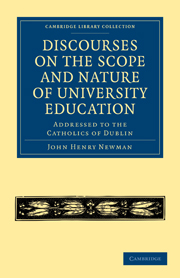Book contents
- Frontmatter
- PREFACE
- Contents
- CORRIGENDA
- Discourse I Introduction
- Discourse II Theology a Branch of Knowledge
- Discourse III Bearing of Theology on other Branches of Knowledge
- Discourse IV Bearing of other Branches of Knowledge on Theology
- Discourse V General Knowledge viewed as One Philosophy
- Discourse VI Philosophical Knowledge its own end
- Discourse VII Philosophical Knowledge viewed in relation to Mental Acquirements
- Discourse VIII Philosophical Knowledge viewed in relation to Professional
- Discourse IX Philosophical Knowledge viewed in relation to Religion
- Discourse X Duties of the Church towards Philosophy
- Appendix
Discourse IX - Philosophical Knowledge viewed in relation to Religion
Published online by Cambridge University Press: 05 July 2011
- Frontmatter
- PREFACE
- Contents
- CORRIGENDA
- Discourse I Introduction
- Discourse II Theology a Branch of Knowledge
- Discourse III Bearing of Theology on other Branches of Knowledge
- Discourse IV Bearing of other Branches of Knowledge on Theology
- Discourse V General Knowledge viewed as One Philosophy
- Discourse VI Philosophical Knowledge its own end
- Discourse VII Philosophical Knowledge viewed in relation to Mental Acquirements
- Discourse VIII Philosophical Knowledge viewed in relation to Professional
- Discourse IX Philosophical Knowledge viewed in relation to Religion
- Discourse X Duties of the Church towards Philosophy
- Appendix
Summary
We shall be brought, Gentlemen, to-day, to the termination of the investigation, which I commenced three Discourses back, and which, I was well aware, from its length, if for no other reason, would make demands upon the patience even of indulgent hearers.
First I employed myself in establishing the principle, that Knowledge is its own reward; and that, when considered in this light, it is called Liberal Knowledge, and is the scope of Academical Institutions.
Next, I examined what is meant by Knowledge, when it is said to be pursued for its own sake; and I showed, that in order satisfactorily to fulfil this idea, Philosophy must be its form, or, in other words, that its matter must not be admitted into the mind passively, as so much acquirement, but must be mastered and appropriated as a system consisting of parts, related one to the other, and interpretative of one another, in the unity of a whole.
Further, I showed that, such a philosophical contemplation of the field of knowledge as a whole, leading, as it did, to an understanding of its separate departments, and an appreciation of them respectively, might in consequence be rightly called an illumination; also, it was rightly called an enlargement of mind, because it was a distinct location of things one with another, as if in space; while it was moreover its proper cultivation and its best condition, both because it secured to the intellect the sight of things as they are, or of truth, in opposition to fancy, opinion, and theory, and again because it presupposed and involved the perfection of its various powers.
- Type
- Chapter
- Information
- Discourses on the Scope and Nature of University EducationAddressed to the Catholics of Dublin, pp. 289 - 332Publisher: Cambridge University PressPrint publication year: 2010First published in: 1852

